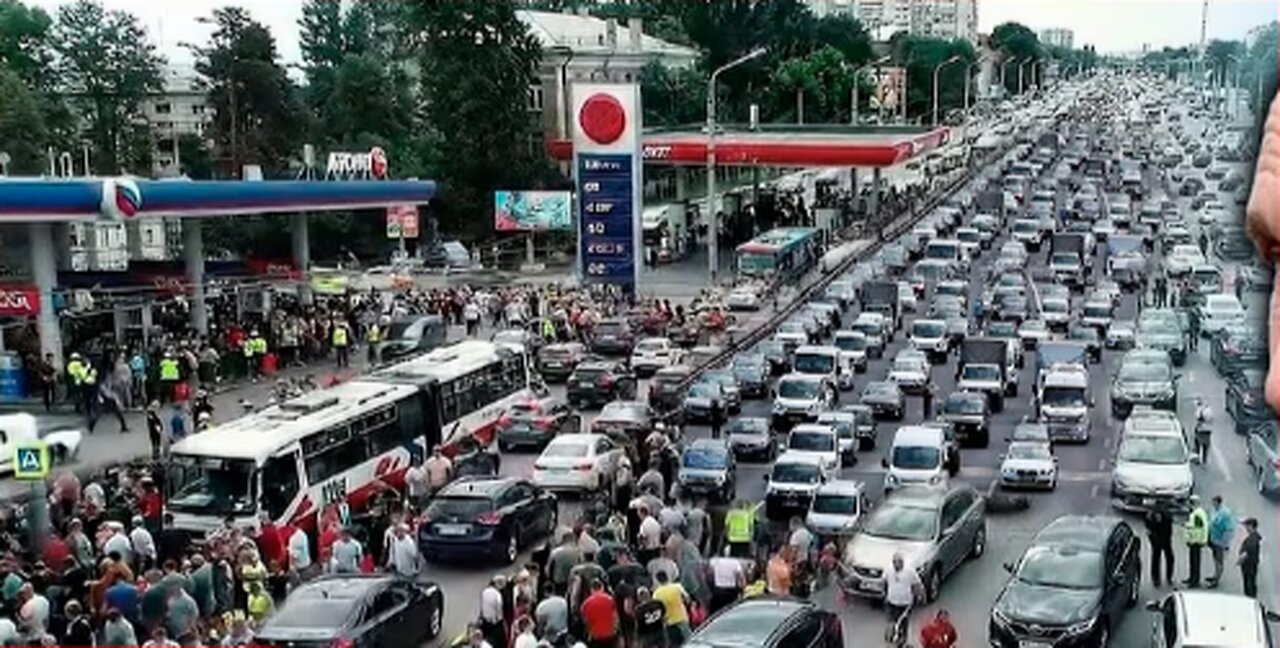Premium Only Content

Rising prices, gasoline shortages in Russia turn into nationwide protests_ Drivers do not tolerate
FOLLOW US!
Russia is reporting a sharp increase in gasoline prices. Drivers in the Nizhny Novgorod region are reporting that the price has increased by 15 rubles in just four shifts. According to eyewitnesses, “people are in shock.” On local television, a gas station worker explained: “Well, 15 rubles at once. It happened in about four shifts. How can I react? Everyone is in shock.”
The situation is repeated in other regions. In some areas, a liter of gasoline already costs 75 rubles. “Of course, people are complaining,” admit locals.
Russia is a huge country, and cars provide a crucial connection between its disparate regions. But with the current price increase, transportation is becoming increasingly expensive. This automatically increases the cost of food, building materials, clothing, and any goods delivered by road — anything that is transported by road. Economists warn that the sharp increase in fuel prices will fuel already rising inflation. The rise in gasoline prices will hit not only drivers but also millions of consumers who will have to pay more for everything from bread to bus tickets.
The cost of the war, experts say, is only growing and will continue to grow, as Russian refineries continue to resist attacks from Ukraine. And Kiev is unlikely to give up this very effective tactic, they say. All this shows that drivers in Russia are not going to tolerate price increases. Their discontent could escalate into nationwide protests. The number of warnings about this is already growing in Russia.
The media has previously reported that Russia is preparing to reduce oil production due to strikes in Ukraine. Transneft, the monopolist of the Russian pipeline system, has warned producers of possible production restrictions after the Ukrainian attacks. Industry sources say the infrastructure is unable to cope with the volume, and further attacks could force Russia to cut production.
Since August, Kyiv has stepped up its attacks on energy facilities, seeking to undermine Moscow's ability to wage war and reduce its revenues. Over the past decade, the oil and gas sector has generated between a third and a half of Russia's budget revenues, remaining the main source of state funding. According to recent estimates, Ukrainian drones have disabled at least ten Russian oil refineries, reducing the country's processing capacity by almost a fifth. The largest Baltic ports of Ust-Luga and Primorsk have also been damaged. In official comments, the Russian authorities have been silent about the scale of the destruction. http://youtube.com/kanal13az/join - click here and support Kanal13 every month by distributing more videos and independent journalism
-
 LIVE
LIVE
The Jimmy Dore Show
2 hours agoJohn Bolton Staring At LIFE IN PRISON! Kash Patel Pushes PURE BS Line About Kirk Assassination!
8,660 watching -
 LIVE
LIVE
Nerdrotic
3 hours ago $6.26 earnedRacist Academics Attack Tolkien | Hollywood to Strike AGAIN? | AI Doomsday - Friday Night Tights 376
2,586 watching -

Dr Disrespect
10 hours ago🔴LIVE - DR DISRESPECT - ARC RAIDERS - THE ULTRA EXTRACTION GAME
143K8 -
 27:49
27:49
Robbi On The Record
21 hours ago $4.16 earnedRevelation, the End Times, and Satan’s Little Season part II - ft JT
25K5 -
 54:37
54:37
HotZone
4 days ago $0.95 earnedTen Hostages Missing! Will Hamas Keep Its Word?
27.1K4 -
 8:05
8:05
Rethinking the Dollar
7 hours agoFiat’s Endgame? Gold & Silver Lines Don't Lie
14.7K6 -
 LIVE
LIVE
LFA TV
23 hours agoLIVE & BREAKING NEWS! | FRIDAY 10/17/25
977 watching -
 1:13:16
1:13:16
vivafrei
4 hours agoJohn Bolton is a DUMB CRIMINAL (Allegedly) - Trans Madness in Loudoun Country! Tampon Tim AND MORE!
89K41 -
 2:45:30
2:45:30
Barry Cunningham
17 hours agoBREAKING NEWS! PRESIDENT TRUMP MEETS WITH UKRAINE PRESIDENT ZELENSKY!
69K25 -
![MAHA News [10.17] Fertility Crisis, Redoing Vax Schedule, Psychiatry Corruption, Vegan vs Carnivore](https://1a-1791.com/video/fwe2/78/s8/1/Q/v/s/r/Qvsrz.0kob-small-MAHA-News-10.17.jpg)
Badlands Media
15 hours agoMAHA News [10.17] Fertility Crisis, Redoing Vax Schedule, Psychiatry Corruption, Vegan vs Carnivore
29K3